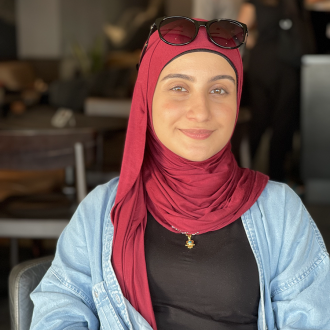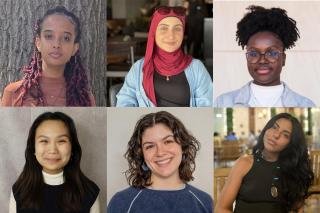Sponsored by the Provost's Office and the Office of Research and Fellowships, the annual Senior Scholar Award is presented to six graduating seniors in recognition of outstanding scholarship and contribution to a field of study.
Congratulations to the 2024 award recipients! The award recipients will be presenting their projects at the annual Senior Scholar Award Showcase.

Nardos Alemu ’24
Major: Computer Science and Mathematics
Project: Automatic Speech Recognition System for Low Resource Languages
Mentor: Nanette Veilleux
Key Contributors: Chelsea Hua '24, Melat Ali '22, Khoi P. N. Nguyen - Fulbright University Vietnam, Phuc H. Le - Fulbright University Vietnam
Presently, Automatic Speech Recognition (ASR) technologies, such as Google Assistant, Apple's Siri, and Amazon's Alexa, predominantly cater to a limited array of languages (e.g., English, Mandarin, Arabic), primarily those from economically advanced countries. Consequently, languages from regions with fewer resources, including Ethiopia, have yet to significantly benefit from these advancements. This research contributes to an international endeavor aimed at developing a blueprint for adapting ASR systems to underrepresented languages, often characterized by limited access to financial and human resources. The project includes the process of employing Kaldi, an existing tool, to establish ASR capabilities for Amharic and Vietnamese, utilizing minimal annotated speech data. The selection of these languages aims to capitalize on the expertise of students and foster intercultural exchanges. The ultimate goal of this research is to formulate a method that allows the integration of any language into ASR systems, provided sufficient annotated data and training materials are available.

Leila Aydibi ’24
Major: Biology, Pre-PA Track
Project: Muslims' Experiences with the Healthcare System in Massachusetts
Mentor: Valerie Leiter
The topic of "Muslims' Experiences with the Healthcare System in Massachusetts" is not a subject of peripheral concern but rather a compelling and essential area of study. The complex healthcare experiences of Muslim individuals in the state of Massachusetts represent an invaluable area for comprehensive investigation. Massachusetts, known for its diversity, boasts a significant Muslim population, each with distinct healthcare needs and perspectives. This diversity, comprising individuals from various cultural and religious backgrounds, adds layers of complexity to the ways in which they interact with and perceive the healthcare system.
Muslims' certain healthcare decisions are influenced by their Islamic faith and cultural practices. Most decisions or preferences are quite similar among Muslims regardless of their sect of Islam such as a need for a healthcare provider of the same gender as the patient. Healthcare providers, policymakers, and researchers must understand how these dynamics unfold and the principles Muslims use to make these healthcare decisions. Muslim Massachusetts' residents offer invaluable insights into improving healthcare accessibility, quality, and effectiveness.
The goal is to provide a holistic exploration of the multifaceted healthcare encounters of Massachusetts Muslim residents, delving into the complex interplay of cultural, religious, and healthcare factors. It seeks to reveal valuable insights that can inform efforts to enhance healthcare experiences for this diverse community. By bridging the gap between healthcare providers and the Muslim population in Massachusetts, this research ultimately aims to contribute to the development of culturally competent and equitable healthcare systems that address the unique needs of this community.

Debora Edouard ’24
Major: Neurobiology
Project: Evaluating the effect of RNAi silencing on the KRAS translocation in pancreatic Cancer Cells
Mentor: Jennifer Roecklein-Canfield
Key Contributors: Molly Riley '23
Membrane-bound Ras proteins are small GTPases involved in the activation of cell proliferation and differentiation. Several Ras family members have been implicated in cancer cells, with mutations in the KRAS gene being the most prevalent. K-Ras is regulated by guanine nucleotide exchange factors (GEF) in the Map kinase cascade. K-Ras is translocated from the endoplasmic reticulum to the plasma membrane via the attraction of a basic hypervariable domain to acidic lipid rafts. This docking allows for recruitment and activation of the Map Kinase Cascade. The end goal of this cascade is activation of transcription factors which enhance proliferation and cell migration. Most cancerous cell lines have a mutation in the KRAS pathway, resulting in increased cell motility and growth. 40% of pancreatic cancer cases have KRAS mutations and current KRAS inhibitors have not been shown to have a consistent impact in patients. RNAi is a regulatory mechanism in eukaryotic cells that uses double stranded RNA as a regulation of gene expression. In drug resistant cancers, studies have shown RNA interference in the KRAS signaling pathway can have a significant therapeutic effect. Small interfering RNA loads onto enzymatic machinery and targets homologous sequences in mRNA transcripts for degradation leading to loss of protein expression in RNAi treated cells. K-Ras C-terminal membrane anchor binds to the lipid phosphatidylserine (PtdSer), a negatively charged phospholipid in the plasma membrane. Loss of PtdSer prevents K-Ras association during translocation (from lysine (basic) rich HVR) thus inhibiting K-Ras signaling. Phosphatidylserine synthase (PTDSS1) is responsible for production of phosphatidylserine and presents a novel target for RNA interference. We evaluated the effect on mRNA levels and cell viability after RNA interference of PTDSS1 in PANC-1 pancreatic cancer cells.

Sarina Lau ’24
Major: Biochemistry
Project: Investigating the role of Aurora A kinase on localization and expression of postsynaptic protein dTACC at the neuromuscular junction in Drosophila melanogaster
Mentor: Seth Johnson
Dysregulation of chemical synapses have shown implications in neurodevelopmental and neurodegenerative disorders, including Autism Spectrum Disorder (ASD) and intellectual disability (ID). My thesis utilizes the neuromuscular junction (NMJ) of the common fruit fly, Drosophila melanogaster, as a model to examine the molecular and genetic mechanisms underlying synapse development and growth. Located at the chemical synapse of the NMJ are synapse proteins which regulate proper growth and development, including microtubule-associated proteins (MAPs). One microtubule-associated protein, dTACC (transforming acidic-coiled coil), has demonstrated localization at the microtubules of presynaptic neurons and postsynaptic muscle, restricting NMJ growth. However, the method by which postsynaptic dTACC localization and expression is regulated has not been determined, and can give a better indication of how the human homolog of TACC is regulated.
To determine how dTACC localization occurs, a screen of synaptic proteins was conducted. One of the proteins screened, Aurora A kinase, causes a significant change in dTACC recruitment at the NMJ when the gene is silenced. Aurora A kinase has previously demonstrated a role in phosphorylation, or localization, of dTACC at centrosomal microtubules. The central question of this project investigates how Aurora A kinase interacts with dTACC at the NMJ to regulate dTACC expression and localization. Within the scope of my thesis, I study the regulation of dTACC using gene silencing and immunohistochemistry to analyze fluorescence distribution and maximum intensity. The results of this study will provide an improved fundamental understanding of how synapse development is regulated and basic mechanisms of neurological disorders.

Estela Raya-Fouts ’24
Major: Political Science and Spanish
Project: The Consequences of Coloniality: Searching for a Queer Decolonial Feminism in Latin America
Mentor: Lena Zuckerwise
The period of European colonialism that lasted from the fifteenth to eighteenth century laid the foundation for modern Latin America, a region that has suffered politically and economically due to the lasting effects of Europe's capitalist system of power and subsequent exploitation of indigenous bodies and cultures. This paper insists that an intersectional analysis is necessary to examine the gender hierarchy imposed during colonialism, persisting in post-colonial Latin America. Analyzing the interactions between power, gender and knowledge in coloniality exposes the construction of 'womanhood,' a concept that has placed indigenous and enslaved women at the bottom of the hierarchy and continues to oppress women of color through Eurocentric global capitalism. I look at the ways decolonial feminism has been used to challenge this hierarchy in Latin America, investigating the movements against femicide and studies on Chicano identities at the border between the US and Mexico. Taking into consideration the intersections of decolonial and queer theory, I assert that one cannot be queer without also being decolonial. Using the third worldism movement in the 1980s and 90s, I posit that decolonial queer thought opens to new possibilities and theories that could pave the way to a more inclusive resistance to colonial structures. This paper presents queer decolonial feminism as an integrated approach to decolonial praxis by assessing the potential of both feminist and queer thought, to move toward knowledge of liberation and decolonial resistance.

Reham Zeroual ’24
Major: Africana Studies and Political Science
Project: Memory: The Making of Algeria's Post-Colonial Identity
Mentor: Tatiana M.F. Cruz
This senior thesis delves into the intricate formation of the Algerian post-colonial identity, rooted in the violent experiences of occupation. Focused on the aftermath of colonial rule, the research explores the psychological traumas embedded in the collective consciousness of Algerians, unraveling the intergenerational transmission of trauma stemming from colonial violence. Examining the nexus of psychological scars and cultural resistance, the study unveils the multifaceted ways in which colonialism has shaped the mental and emotional landscapes of contemporary Algerians.
The analysis extends to the resilience embedded in Algerian culture, showcasing how artistic expressions, language, and traditions served as avenues of resistance against colonial dominance. Through examination of oral histories, and archival materials, the study unveils the mechanisms of resistance that not only preserved indigenous identity but also contributed to the emergence of hybrid or new cultural expressions. The complex interplay between past and present fosters a nuanced understanding of the collective memory imprints on the Algerian psyche.

